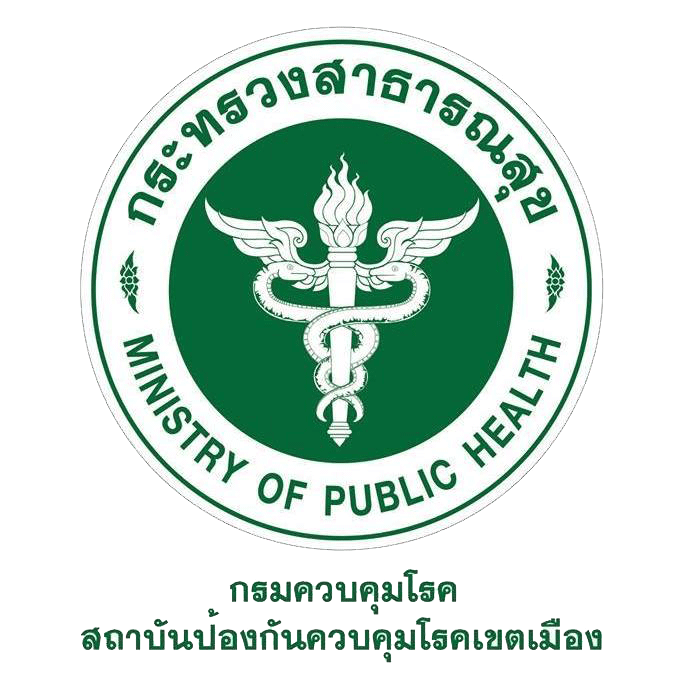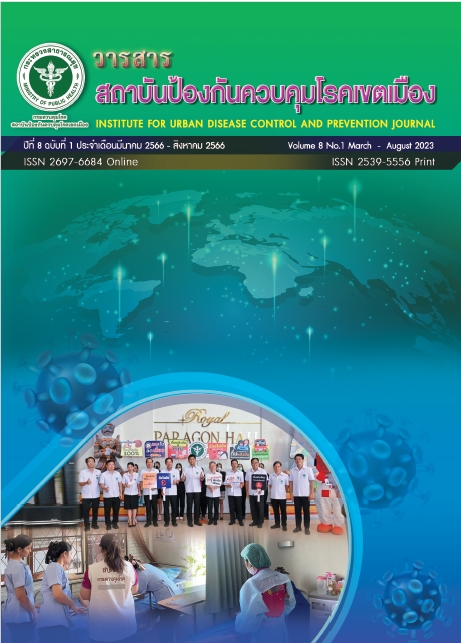การบริหารจัดการความเหนื่อยล้าจากงานของบุคลากรโรงพยาบาลบางบัวทอง 2 ในช่วงสถานการณ์ระบาดของโรคติดเชื้อไวรัสโคโรนา 2019
Main Article Content
บทคัดย่อ
จากการระบาดของโรคติดเชื้อไวรัสโคโรนา 2019 โรงพยาบาลบางบัวทอง 2 ปรับการให้บริการ เพื่อการรักษาผู้ป่วยโรคติดเชื้อไวรัสโคโรนา 2019 ความเหนื่อยล้าจากการปฏิบัติงานสร้างความเครียดสะสมที่ก่อให้เกิดภาวะเหนื่อยล้าจากงาน โดยการวิจัยนี้มีวัตถุประสงค์เพื่อศึกษาความเหนื่อยล้าจากงานของบุคลากรโรงพยาบาลบางบัวทอง 2 ในช่วงสถานการณ์ระบาดของโรคติดเชื้อไวรัสโคโรน่า 2019 ศึกษาในกลุ่มบุคลากรโรงพยาบาลบางบัวทอง 2 เก็บข้อมูลในช่วงเดือนพฤศจิกายนถึงธันวาคม พ.ศ. 2565 โดยใช้แบบสอบถามและแบบสัมภาษณ์สนทนากลุ่มย่อย ใช้สถิติวิเคราะห์ถดถอยพหุคูณเพื่อหาความสัมพันธ์ของปัจจัยที่ศึกษา
ผลการศึกษาพบว่าบุคลากรโรงพยาบาลบางบัวทอง 2 จำนวน 89 คน เป็นเพศหญิง 68 คน (ร้อยละ76.4) และชาย 21 คน (ร้อยละ 23.6) เวลาปฏิบัติงานเฉลี่ย 62.5 ชั่วโมง/สัปดาห์ ส่วนใหญ่มีการนอนหลับที่ไม่เพียงพอร้อยละ 55 และร้อยละ 55 เคยมีความคิดที่จะลาออกจากงานโดยมีสาเหตุมาจากภาระงานที่มากเกินไปและความขัดแย้งในการทำงานร้อยละ 23 กลุ่มตัวอย่างมีคะแนนความเหนื่อยล้าจากงานด้านความอ่อนล้าทางอารมณ์ในระดับสูงร้อยละ 52.8 ด้านการลดความเป็นบุคคลในระดับสูงร้อยละ 39.3 และมีการลดความสำเร็จส่วนบุคคลในระดับต่ำร้อยละ 68.5 ผลการวิเคราะห์การถดถอยพหุคูณพบว่า ปัจจัยที่มีความสัมพันธ์กับความเหนื่อยล้าจากงานในช่วงสถานการณ์ระบาดของโรคติดเชื้อไวรัสโคโรน่า 2019 คือ ความเพียงพอในการนอนหลับ การได้รับการสนับสนุนจากเพื่อนร่วมงาน และความคิดลาออกจากการปฏิบัติงาน
ข้อเสนอแนะที่ได้จากการวิจัย ควรจัดสรรจำนวนบุคลากรให้มีความเหมาะสมต่อภาระงาน โดยพิจารณาถึงความเชี่ยวชาญของแต่ละบุคคล และจัดสรรเครื่องมือและอุปกรณ์ที่ช่วยลดภาระในการทำงาน ให้มีความเพียงพอ
Article Details

อนุญาตภายใต้เงื่อนไข Creative Commons Attribution-NonCommercial-NoDerivatives 4.0 International License.
บทความที่พิมพ์ในวารสารสถาบันป้องกันควบคุมโรคเขตเมือง ถือว่าเป็นผลงานวิชาการ งานวิจัยและวิเคราะห์ ตลอดจนเป็นความเห็นส่วนตัวของผู้เขียนเอง ไม่ใช่ความเห็นของสถาบันป้องกันควบคุมโรคเขตเมือง หรือคณะบรรณาธิการแต่ประการใด ผู้เขียนจำต้องรับผิดชอบต่อบทความของตน
เอกสารอ้างอิง
งานโรคติดต่ออุบัติใหม่กลุ่มพัฒนาวิชาการโรคติดต่อ. สถานการณ์โรคติดเชื้อไวรัสโคโรนา 2019 (COVID-19) มาตรการสาธารณสุขและปัญหาอุปสรรคการป้องกันควบคุมโรคในผู้เดินทาง [อินเทอร์เน็ต]. 2565 [เข้าถึงเมื่อ 26 กันยายน 2565]. เข้าถึงได้จาก: https://ddc.moph.go.th/uploads/files/2017420210820025238.pdf
โรจน์ งามแม้น. ไทยโพสต์ [อินเทอร์เน็ต]. กรุงเทพมหานคร: ไทยโพสต์; 2564 [เข้าถึงเมื่อ 26 กันยายน 2565]. เข้าถึงได้จาก: https://www.thaipost.net/main/detail/99304
สมพร หุ่นเลิศ. เอกสารรายงานภาพรวมโรงพยาบาลบางบัวทอง 2 เพื่อขอรับการประเมินมาตราฐานโรงพยาบาลและบริการสุขภาพ (HA). การประชุมการขอรับรองคุณภาพสถานพยาบาลขั้นที่ 2; 26 กันยายน 2565; โรงพยาบาลบางบัวทอง 2. นนทบุรี: กลุ่มการพยาบาล; 2565. น.10-2.
Cordes CL, Dougherty TW. A review and integration of research on job burnout. Academy of Management Review.1993;18(4):621–656.
Maslach C, Goldberg J. Prevention of burnout: New perspectives. Applied and Preventive Psychology. 1998;7:63–74.
Moreno ES, Roldán INLS, Peralta LPG, Roda ABL. Burnout, Informal Social Support and Psychological Distress among Social Worker. The British Journal of Social Work. 2015;45(8):2368–386.
กรมสุขภาพจิต. การดูแลจิตใจบุคลากรทางการแพทย์และสาธารณสุข [อินเทอร์เน็ต]. นนทบุรี: กรมสุขภาพจิต; 2563 [เข้าถึงเมื่อ 26 กันยายน 2565]. เข้าถึงได้จาก: https://www.dmh.go.th/covid19/pnews/view.asp?id=64
สิระยา สัมมาวาจ. ความเหนื่อยหน่าย (Burnout) ของผู้บริหารระดับต้นทางการพยาบาล ศึกษาเฉพาะกรณีหัวหน้าหอผู้ป่วยในโรงพยาบาลรามาธิบดี. [วิทยานิพนธ์ปริญญารัฐศาสตรมหาบัณฑิต]. กรุงเทพฯ: มหาวิทยาลัยธรรมศาสตร์; 2534.
รุจิรา ตวงเพิ่มทรัพย์, วินิทรา นวลละออง, ธรรมนาถ เจริญบุญ. ภาวะเหนื่อยล้าในการทำงานและปัจจัยที่เกี่ยวข้องกับแพทย์ประจำบ้านโรงพยาบาลธรรมศาสตร์เฉลิมพระเกียรติ ในสถานการณ์ที่มีการแพร่ระบาดของ COVID-19. วารสารสมาคมจิตแพทย์แห่งประเทศไทย. 2564;66(2):189-202.
นครินทร์ ชุนงาม. สุขภาพจิตและภาวะหมดไฟในการทำงานของแพทย์ในโรงพยาบาลทั่วไปและโรงพยาบาลชุมชนจังหวัดนครราชสีมา. วารสารสุขภาพจิตแห่งประเทศไทย. 2563;28(4):348-59.
ศรัณย์ ศรีคำ, วิโรจน์ เจียมจรัสรังษี, เดชา ลลิตอนันต์พงษ์. ภาวะเหนื่อยล้าในการทำงานและปัจจัยที่เกี่ยวข้องของแพทย์ประจำบ้านโรงพยาบาลจุฬาลงกรณ์. วารสารสมาคมจิตแพทย์แห่งประเทศไทย. 2557;59(2):139-50
วิเชียร มันแหล่. ผลกระทบและการปรับตัวของประชาชนในสถานการณ์การแพร่ระบาดของโรคโควิด-19 จังหวัดนครศรีธรรมราช. วารสารมหาจุฬานาครทรรศน์. 2564;8(11):327-340.
ณัฐนันท์ ฤทธิ์สำเร็จ, ธีระวุธ ธรรมกุล, ปกกมล เหล่ารักษาวงษ์. ปัจจัยที่มีความสัมพันธ์กับภาวะหมดไฟในการทำงานของบุคลากรในโรงพยาบาลเอกชน อำเภอเมืองชลบุรี จังหวัดชลบุรี. วารสารสาธารณสุขมหาวิทยาลัยบูรพา. 2565;17(1):86-99.
นิชชุนันท์ ประสารพันธ์. ภาวะหมดไฟในการทำงานและปัจจัยที่เกี่ยวข้องของบุคลากรในโรงพยาบาลเอกชน กรุงเทพมหานคร. วารสารพยาบาลสาธารณสุข. 2564;35(3):48-63.
วีระยุทธ บุญเกียรติเจริญ, บุญเติม แสงดิษฐ์, ทศพร วิมลเก็จ. ความเหนื่อยหน่ายของพยาบาลห้องผ่าตัดในโรงพยาบาลของรัฐในกรุงเทพมหานคร. เวชสารแพทย์ทหารบก. 2561;71(3):163-72.


